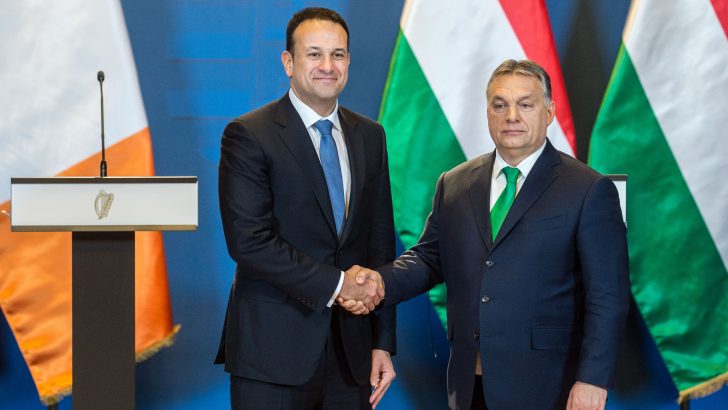What are we to make of Viktor Orban, the Hungarian leader who is almost certain to be swept back to power in the Hungarian spring election? He is regarded as an ‘anti-liberal’ and ‘semi-authoritarian’ by the European Union – and Taoiseach Leo Varadkar was widely criticised in Ireland just for paying a visit to Mr Orban’s Hungary.
Orban’s political views are indeed hardly liberal and the pictures of razor-wire fences between Hungary and Serbia – keeping out refugees – are indeed distressing. And yet his supporters say that he has put his country on the right track, rescuing it from the doldrums after decades of post-Communist mismanagement, restoring its sovereignty, sense of national self-worth, and placing Christian values and the family at the centre of national life.
Without Orban’s courage and greatness, says Foreign Minister Peter Szijjarto, Hungary would have been reduced to the same condition as Greece.
Sworn foe
Orban is also the sworn foe of George Soros, the Hungarian-born billionaire, who Orban portrays as seeking to meddle in Hungarian political life, exerting influence through financial power.
Viktor Orban often refers to Hungary’s historic role as a Christian nation, and especially to the link with Poland, when, together, the two halted the Ottoman invasion of Europe in 1683. With the departure of Britain from the EU, the Visegrad countries – Poland, Hungary, the Czech Republic and Slovakia, are strengthening their common links – and have invited Austria to join them. Viktor Orban seems to be emerging as the driving force of this group within the EU 27.
But there is a Christian dilemma here. Pope Francis has clearly enjoined us to shelter the refugee and the asylum seeker: the Visegrad group is opposed to this, while affirming their Christian traditions.
I suppose we must bear in mind that geography always plays a strong part in national outlook. Hungary, Austria and Poland are placed at the very crossroads of Europe: those of us who are island nations have the perspective of distance.
Acceptance can be wonderful
Beth Morton is a 26-year-old maternity ward receptionist living in Essex with her partner, Danny Bellamy, aged 32. They had no plans to embark on parenthood – Beth was taking the contraceptive Pill. But to her astonishment, and against the odds, she found that she was pregnant. Indeed, she was informed that she was pregnant with triplets.
Multiple births can put a strain on a mother, and Miss Morton was offered a “selective reduction” of the pregnancy – in which doctors would abort one, or even two, of the babies in utero. But both Beth and Danny refused. Beth said: “There was no way that we would have considered a selective termination. How could you possibly choose one baby’s life over another? We were determined to give all three of them the best possible chance. I knew it was a risky pregnancy, but I trusted the doctors to look after us all.”
The triplets – an adorable trio named Archie, Lola and Ralphie – were induced at 35 weeks’ pregnancy, and all are thriving. Beth says that “they may have been a surprise, but I can’t imagine life without them now”.
We talk a lot about choices these days – and choice, in principle, is not to be disparaged, since it is part of our free will. But sometimes, acceptance is also beautiful and inspiring. Beth didn’t choose to become a mother – she was quite evidently avoiding the possibility. Yet when it happened, she was open to life and defied the medics’ suggestion that she should “reduce” the pregnancy. Bravissima!
Young minds need support
Eight young students at Bristol University have killed themselves over the past six months. There is no connection between the eight suicides, except that apparently these young people felt depressed and homesick.
What’s especially upsetting is that parents in at least one case sought pastoral help from the university authorities on behalf of their son, who they felt was troubled. But the authorities rebuffed the parents saying the students were “adults” and families had no entitlement to contact with them.
Adulthood is something you transition into: it doesn’t happen overnight at 18, or, as some would have it,16. Many young people need care and family protection for much longer than we might imagine.


 Mary Kenny
Mary Kenny An Taoiseach Leo Varadkarin Hungary to meet Viktor Orban.
An Taoiseach Leo Varadkarin Hungary to meet Viktor Orban. 